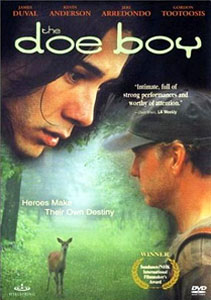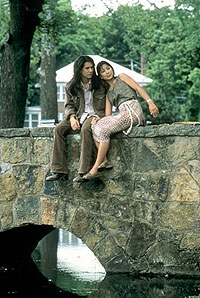 Hunter is a hemopheliac kid who lives in a rural area (the Cherokee Nation in Oklahoma) where hunting is important. As a youngster, despite his hemophelia, his father (Kevin Anderson) takes him on his first hunt. Alas, while his dad was napping, the kid killed a doe.
Hunter is a hemopheliac kid who lives in a rural area (the Cherokee Nation in Oklahoma) where hunting is important. As a youngster, despite his hemophelia, his father (Kevin Anderson) takes him on his first hunt. Alas, while his dad was napping, the kid killed a doe.
As a kid, Hunter is played by Andrew J. Ferchland; as a young man he's played by James Duval, who that same year was Frank in Donny Darko (2001).
For years after Hunter became known as "the doe boy" who couldn't tell a buck from a doe. And his maternal grandfather Marvin turned it into the humiliating story "The Hunter Who Shot a Woman."
I hugely admired Gordon Tootoosis's performance as the grandfather. It was first off a well written role & Tootoosis made it real. He's not your standard wise old romantic snow-haired Indian such as populate cinema when it tries to be "sensitive" toward Native Americans but can often come off annoyingly sentmental, such as Tootoosis could easily play with conviction. The epitome of that type was Chief Dan George as Old Lodge Skins of "Good day to die" fame in Little Big Man (1970).
As pure romance the archetype has definite appeal, but it's not real. By contrast, Marvin even while he does embody history & the wisdom of elders, he also seems like an actual person, not a "noble savage" cliche. He's a good guy but with crabby moments like anyone.
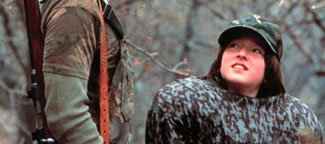 Tommy Deer-in-Water (James Smith, Jr.) is a top local hunter, whom Hunter greatly admires. Tommy Deer-in-Water (James Smith, Jr.) is a top local hunter, whom Hunter greatly admires.
Young Hunter, whose very name should have defined his destiny, was never given a second chance to hunt. Yet his desire to be a hunter has never left him.
He has no desire to do it "white man style" like his father, dressing up like a tree & hiding with a high powered rifle. Rather, he wants to be like Tommy Deer-in-Water who only needs one arrow.
For the bulk of the film it's about a mildly dysfunctional family coping, loving, dreaming, hoping, a universal tale for any race, though mostly about Indian characters.
It's early in the year 1980, a time when a number of hemophiliacs contracted AIDs from contaminated blood.
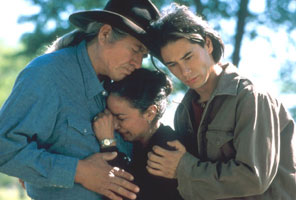 Hunter has to be tested & while waiting for the results, he knows only that live or die, he goes on a hunt with one arrow. The tension between the worry & the intent provides several beautiful, beautiful moments. Hunter has to be tested & while waiting for the results, he knows only that live or die, he goes on a hunt with one arrow. The tension between the worry & the intent provides several beautiful, beautiful moments.
It's hard to describe such a sensitive realistic film adequately as I fear my discription has made it seem like a soapy soft slice-of-life, when it's packed with amazing performances that reach the heart with truths & human struggles, never relying on sentiment or tearjerking tricks.
The film was a great success at Sundance & lauded at numerous film festivals including at the American Indian Film Festival where it swept awards for best film, best director, best lead actor (Duval), & best actress (Jeri Arrendondo who plays Hunter's Cherokee mom).
The effectiveness of such a fine script so well acted is enhanced by a wonderful soundtrack. The music is by native artists, across the board superbly chosen.
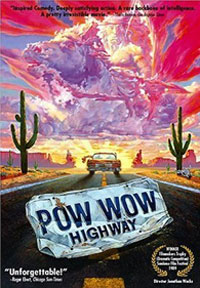 "I want to buy one of your fine ponies," says Philbert Bono (Gary Farmer in a milestone performance) to a junkyard car dealer.
"I want to buy one of your fine ponies," says Philbert Bono (Gary Farmer in a milestone performance) to a junkyard car dealer.
As he gazes on the vista of rusty relics, he momentarily sees a wholesome scene out of the past, with a beautiful pinto pony running wild. Anyone who has ever dreamed of a world more beautiful than has been inherited will instantly love Philbert.
He picks the uglieset most pathetic vehicle (a wreck of a '64 Buick) & laughing with joy starts off down the Pow Wow Highway (1989).
Now it may be that Philbert's not the brightest hat on the hatrack, but Buddy Redbow (A. Martinez) is one hell of an intelligent young AIM activist, not easily fooled by mining interests' bullshit about how much Indians have to gain by signing over rights to white people. Quite rightly, he's more than a little angry about the gullible decision-making going on in the tribe.
One day Buddy Redbow's sister Bonnie (Joannelle Nadine Romero) gets pulled over with marijuana in her trunk. She's busted so calls the reservation to get help from her brother, who she hasn't been in touch with for years, & who didn't even know he's twice an uncle.
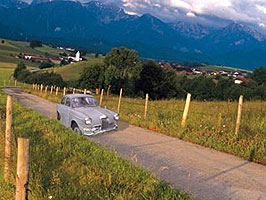 "The time has come for me to search for medicine," Philbert tells his old auntie (Maria Antoinette Rogers). "The time has come for me to search for medicine," Philbert tells his old auntie (Maria Antoinette Rogers).
She laughs at him & chastises him harshly for his stupid interest in such syrupy nonsense as "old Indian Wisdom." Gilbert's so sweet & naive & in love with a dreamy ideal, it does sometimes make him seem retarded, though only because "normal" intelligent people in this bad world have become steeped in cynicism.
He calls his beater Buick, "Protector, the war pony," & though it doesn't look like it can get him far, he's game for a trip to Santa Fe, taking Redbow to help Bonnie. It's a classic Road Trip journey of discovery, growth, seen time & again in cinema, made richer by the fact of it being Philbert's spirit quest in a modern-update context.
Philbert, who wants to become Whirlwind Dreamer, with his innocent conviction that the old ways persist, is inspiring, if you allow him to be so. That he does seem to have real visions means he's either brain-damaged, or he's totally authentic. I kept voting for the latter. When he offered his candy bar to the Spirit of White Cloud, my stomach tightened with admiration, & it was at that moment in the film I just said it, right out loud, "I love him!"
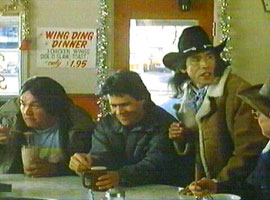 The Bureau of Indian Affairs is conspiring to keep Redbow off the reservation until they can trick the tribe into signing over mineral rights. The Bureau of Indian Affairs is conspiring to keep Redbow off the reservation until they can trick the tribe into signing over mineral rights.
In fact it's the Feds who framed Bonnie to get Buddy Redbow to head off. What the Feds don't know, & could never believe, as even Redbow can't believe it, is that Philbert is gathering warrior power.
It's good to see some old hands at the acting game with side-roles, though we might've wished them more screen time. Wes Studi who has only once in his life given a bad performance -- that was in Mystery Men (1999) -- is a pleasure to see playing a colorful Indian bubba.
And we get a glimpse of Graham Green, forever to be remembered for his moving performance in One Flew Over the Cuckoo's Nest (1975), though my favorite of his films is Clearcut (1991). In Pow Wow Highway he has a cameo as a stuttering knife-throwing war vet, a nice mini-performance of deep sadness.
The film is chock full of angsty anguished beauty, even just Bonnie's two half-Indian children with Rabbit (Amanda Wyss) asking for the first time in their lives what tribe they are, it is just heartbreakingly endearing. But the film is no tearjerker, by no means. It is extremely witty, & uplifting in its evidence of the Cheyenne warrior spirit still vital in this world, representing decency, honesty, compassion, & strength.
copyright © by Paghat the Ratgirl
|
